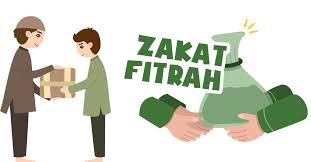In Islam, Zakat al-Fitr (Zakat of Breaking the Fast of Ramadan), also known as Sadaqat al-Fitr (Charity of Breaking the Fast) or Zakat al-Fitrah (the Alms of Human Nature) is a form of alms-giving which Islam considers required of every able Muslim at the end of Ramadan. The purpose of Zakat al-Fitr is to enable poor people to celebrate Eid al-Fitr, the festival to break the fast of Ramadan.

In Islam it is mandatory from sunset on the last day of fasting and remains so until the beginning of Eid prayer (i.e., shortly after sunrise on the following day). However, it can be paid prior to this period. The amount of Zakat is the same for everyone regardless of their income: the minimum amount is one sa`/muddh (four double handfuls) of food, grain or dried fruit for each member of the family,
Classification
Sadaqat al-Fitr is a duty which is considered wajib (required) of every Muslim, whether male or female, minor or adult as long as they have the means to do so. According to Islamic tradition (Sunnah), Ibn ‘Umar said that the Islamic Prophet Muhammad made Zakat al-Fitr compulsory on every slave, freeman, male, female, young and old among the Muslims; one Saa of dried dates or one Saa of barley.
The head of the household may pay the required amount for the other members. Abu Sa’eed al-Khudree said:
On behalf of our young and old, free men and slaves, we used to take out during Allah’s Messenger’s (upon whom be God’s peace and blessings) lifetime one Saa` of grain, cheese or raisins”.
